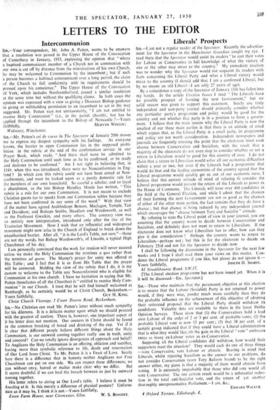Sul,—No Christian can read Mr. Patten's letter without much sympathy
for his dilemma. It is a delicate matter upon which we should proceed with the greatest of caution. There is, however, one important aspect of it his letter does not mention. Our oneness in Christ should be found in the common breaking of bread and drinking of the cup. Yet if it is clear that different people believe different things about the Holy Communion, is our outward coming together really one in truth, unity and concord? Can we totally ignore divergences of approach and belief? To Anglicans the Holy Communion is an offering, oblation and sacrifice, having more than symbolic reference to life, death and resurrection of Our Lord Jesus Christ. To Mr. Patten it is a Feast of Love. Surely here there is a difference that in honesty neither Anglicans nor Free Churchmen can put on one side. We can respect these differences; we
can without envy, hatred or malice make clear why we differ. But it seems doubtful if we can heal the breach between us just by outward coming together.
His letter refers to sitting at Our Lord's table. I believe it must be kneeling at it. Is this merely a difference of physical posture? Unfortu- nate as it may be, I think it is not.—Yours faithfully, Ewen Farm House, near Cirencester, Glos. W. S. Bovcorr.










































 Previous page
Previous page